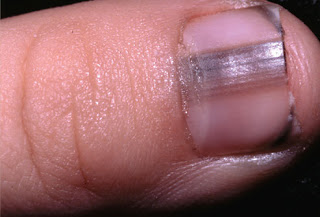Did you know your nails can reveal clues to your overall health? A touch of white here, a rosy tinge there, or some rippling or bumps may be a sign of disease in the body. Problems in the liver, lungs, and heart can show up in your nails. Keep reading to learn what secrets your nails might reveal.
White Nails
If the nails are mostly white with darker rims, this can indicate liver problems, such as hepatitis. In this image, you can see the fingers are also jaundiced, another sign of liver trouble.
Very pale nails are sometimes linked to aging. But they can also be a sign of serious illness, such as:
· Anemia
· Congestive heart failure
· Diabetes
· Liver disease
· Malnutrition
· Anemia
· Congestive heart failure
· Diabetes
· Liver disease
· Malnutrition
White Nails
If the nails are mostly white with darker rims, this can indicate liver problems, such as hepatitis. In this image, you can see the fingers are also jaundiced, another sign of liver trouble.
One of the most common causes of yellow nails is a fungal infection. As the infection worsens, the nail bed may retract, and nails may thicken and crumble. In rare cases, yellow nails can indicate a more serious condition such as severe thyroid disease or psoriasis
Nails with a bluish tint can mean the body isn't getting enough oxygen. This could indicate an infection in the lungs, such as pneumonia.
If the nail surface is rippled or pitted, this may be an early sign of psoriasis or inflammatory arthritis. Psoriasis is a skin condition that starts in the nails 10% of the time.
Dry, brittle nails that frequently crack or split have been linked to thyroid disease. Cracking or splitting combined with a yellowish hue is more likely due to a fungal infection
If the skin around the nail appears red and puffy, this is known as inflammation of the nail fold. It may be the result of lupus or another connective tissue disorder.
Dark lines beneath the nail should be investigated as soon as possible. They are sometimes caused by melanoma, the most dangerous type of skin cancer.
Biting your nails may be nothing more than an old habit, but in some cases it's a sign of persistent anxiety that could benefit from treatment. Nail biting or picking has also been linked to obsessive-compulsive disorder. If you can't stop, it's worth discussing with your doctor.
Though nail changes accompany many conditions, these changes are rarely the first sign. And many nail abnormalities are harmless -- not everyone with white nails has hepatitis. If you're concerned about the appearance of your nails, see a dermatologist
Article from: WebMD
Article from: WebMD









